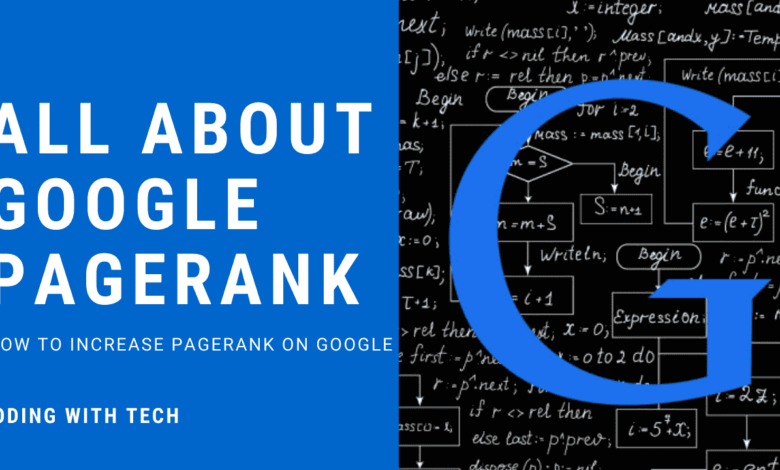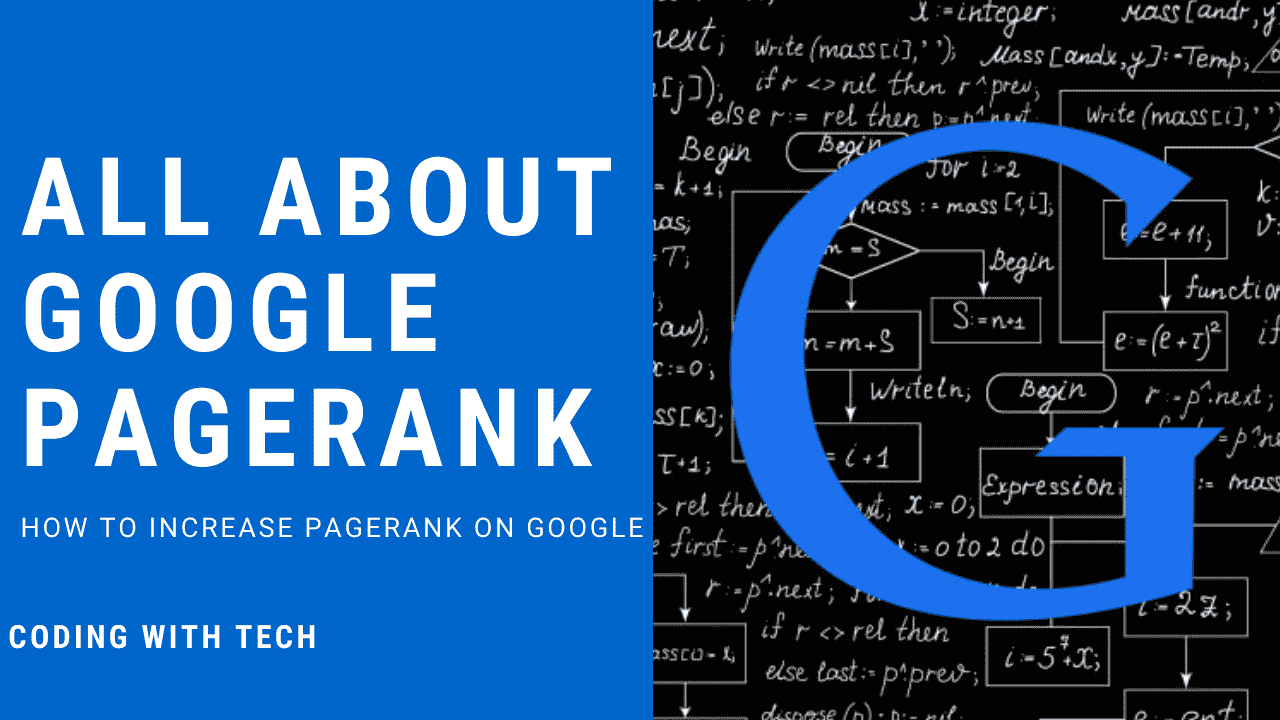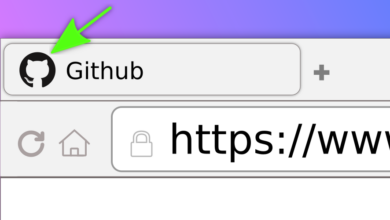
What is Google PageRank? Unlocking Search Secrets
What is google page rank – What is Google PageRank? It’s a question that’s fascinated webmasters and experts for years. This mysterious algorithm, a cornerstone of Google’s search dominance, once held a near-mythical status, whispering promises of higher rankings and increased website traffic. While its public display is long gone, understanding its legacy remains crucial to grasping the complex world of search engine optimization ().
Let’s dive into the fascinating history and enduring impact of PageRank.
Initially conceived by Google’s founders, Larry Page and Sergey Brin, PageRank aimed to quantify a website’s importance based on the number and quality of links pointing to it. Think of it like a popularity contest: the more reputable websites linking to yours, the more prestigious your site appears to Google’s algorithm. This simple yet revolutionary concept fundamentally changed how we approach online visibility.
It wasn’t just about the content itself; the network of connections became equally vital.
Definition of Google PageRank: What Is Google Page Rank
PageRank, a cornerstone of Google’s search algorithm, is a way of measuring the importance of websites on the internet. It’s not the only factor Google uses, but it’s historically significant and still plays a role in determining which pages appear higher in search results. Understanding PageRank helps us understand how Google organizes and presents information to billions of users worldwide.PageRank’s development is deeply intertwined with the very origins of Google.
In the late 1990s, the World Wide Web was a chaotic place, lacking a sophisticated system for determining which websites were most authoritative or relevant. Larry Page and Sergey Brin, the founders of Google, recognized this problem and developed PageRank as a solution. Their groundbreaking approach revolutionized search engine technology, shifting the focus from matching to the concept of link analysis – essentially, judging a website’s importance based on the number and quality of links pointing to it.
The Core Concept of PageRank as a Ranking Algorithm
At its heart, PageRank operates on the principle of “votes” from other websites. A link from one page to another is considered a vote of confidence, suggesting that the linking page finds the linked page valuable or relevant. However, not all votes are created equal. A link from a highly authoritative website carries more weight than a link from a less reputable site.
PageRank essentially calculates a score for each website based on the quantity and quality of these incoming links, with more links from high-ranking sites leading to a higher PageRank score. This creates a recursive system where the importance of a page influences the importance of pages linking to it, and vice-versa.
A Simplified Explanation of PageRank
Imagine a network of interconnected websites. Each website is a node in this network, and the links between them are the connections. PageRank assigns a numerical value (its PageRank score) to each website based on the number and quality of incoming links. A website with many links from other high-scoring websites will have a higher PageRank score.
Think of it like popularity voting: a website with many endorsements (links) from popular websites (high PageRank) becomes more popular itself (higher PageRank). The algorithm iteratively recalculates these scores, taking into account the influence of each link, until the scores stabilize.
An Analogy to Illustrate PageRank
Consider a school election for class president. A candidate who receives endorsements from popular and influential students (websites with high PageRank) is likely to gain more votes (higher PageRank) than a candidate endorsed only by less-known students. The more endorsements from influential students a candidate receives, the more likely they are to win the election. Similarly, a website with many links from high-PageRank websites is more likely to rank higher in Google’s search results.
The iterative nature of the algorithm is like the election campaign itself; endorsements influence further endorsements, and the candidate’s popularity keeps changing until election day (the algorithm stabilizes).
Factors Influencing PageRank
PageRank, Google’s algorithm for ranking websites in search results, isn’t a simple calculation. It’s a complex process influenced by numerous factors, all working together to determine a website’s authority and relevance. Understanding these factors is crucial for anyone aiming to improve their website’s search engine visibility. This section delves into the key elements that Google considers when assigning a PageRank score.
Backlinks and Their Significance
Backlinks, or inbound links, are arguably the most important factor influencing PageRank. They represent votes of confidence from other websites. When a reputable website links to yours, it signals to Google that your content is valuable and trustworthy. The sheer number of backlinks isn’t the only factor; the quality and relevance of those links matter significantly more.
A single backlink from a high-authority website can be far more impactful than hundreds of links from low-quality or irrelevant sites. Think of it like a recommendation system – a recommendation from a trusted expert carries far more weight than numerous recommendations from unknown sources.
Link Quality: Relevance and Authority
The quality of backlinks is paramount. Google’s algorithm is sophisticated enough to differentiate between a high-quality, relevant backlink and a low-quality, spammy one. A relevant backlink comes from a website whose content is closely related to yours. For example, a backlink from a reputable gardening blog would be highly relevant to a website selling gardening tools. Authority refers to the overall trustworthiness and reputation of the linking website.
A backlink from a well-established, authoritative website will carry more weight than one from a newly created or untrusted source. Google’s algorithm analyzes various factors to assess link quality, including the website’s domain authority, its content quality, and its overall reputation within its niche.
Internal vs. External Links
Both internal and external links play a role in PageRank, but they influence it in different ways. External links, as discussed above, are crucial for building authority and improving search engine rankings. Internal links, on the other hand, help Google understand the structure and organization of your website. They guide users (and search engine crawlers) through your site, allowing them to easily access relevant pages.
While internal links don’t directly boost PageRank in the same way as external links, they contribute to a better user experience and improved site navigation, which indirectly affects your ranking. A well-structured website with clear internal linking is more likely to rank higher than a poorly organized one, even if both have similar external link profiles.
Factors Influencing PageRank: A Summary Table
| Factor | Description | Positive Impact | Negative Impact |
|---|---|---|---|
| Backlinks | Inbound links from other websites | Increased PageRank, improved search engine visibility, enhanced website authority | Low-quality or irrelevant backlinks can harm PageRank and even lead to penalties |
| Link Relevance | How closely related the linking website’s content is to yours | Higher weight given to backlinks from relevant websites | Backlinks from irrelevant websites have minimal or no positive impact |
| Link Authority | The reputation and trustworthiness of the linking website | Backlinks from high-authority websites significantly boost PageRank | Backlinks from low-authority or spammy websites can negatively impact PageRank |
| Internal Linking | Links within your own website | Improved site navigation, better user experience, helps Google understand site structure | Poor internal linking can confuse users and search engine crawlers, hindering ranking |
PageRank’s Role in Search Results
PageRank, while not the sole determinant of search ranking anymore, still plays a significant role in how Google orders search results. It’s a crucial factor in Google’s algorithm, influencing a website’s visibility and ultimately, its traffic. Understanding its impact is vital for anyone aiming for online success.PageRank’s influence on search engine results pages (SERPs) is complex and intertwined with many other ranking factors.
Essentially, a higher PageRank suggests to Google that a website is more authoritative and trustworthy, leading to a better placement in search results for relevant s. Think of it as a vote of confidence from other websites – the more high-quality websites link to yours, the higher your PageRank tends to be.
PageRank and Website Visibility, What is google page rank
A higher PageRank generally translates to increased website visibility. Websites with a higher ranking appear on the first page of Google search results more often for relevant s. This significantly increases the chances of users finding your website organically. The inverse is also true; a low PageRank makes it harder for your website to compete for visibility, potentially pushing it down to lower search result pages where it’s less likely to be seen by users.
Consider two identical websites offering the same product; the one with the higher PageRank will likely receive more clicks simply because it appears higher in the search results.
PageRank and Website Traffic
Increased visibility directly impacts website traffic. A high PageRank improves the chances of your website appearing prominently in search results, leading to more organic clicks and increased traffic. This organic traffic is often considered higher quality than traffic from paid advertising because it signifies genuine user interest. A website with a high PageRank is more likely to attract a steady stream of visitors who are actively searching for the information or products it offers.
For example, a well-established e-commerce site with a high PageRank will likely experience significantly more sales compared to a new, similar site with a low PageRank, even if the products and prices are identical.
Limitations of Relying Solely on PageRank for Website Optimization
While PageRank is a significant factor, relying solely on it for website optimization is a mistake. Google’s algorithm is incredibly complex and incorporates hundreds of ranking factors beyond PageRank. These include factors such as website speed, mobile-friendliness, content quality, user experience, and the overall relevance and authority of the content. Focusing exclusively on PageRank might lead to neglecting these crucial aspects, ultimately hindering website performance.
For instance, a website might have a high PageRank due to numerous backlinks from low-quality websites (a practice known as link farming). This would likely be counterproductive in the long run, as Google’s algorithm penalizes such manipulative practices. A holistic strategy that addresses all aspects of website optimization is far more effective than solely pursuing a high PageRank.
PageRank and Website Authority
PageRank, while no longer a publicly available metric, remains a crucial concept in understanding website authority. Its legacy continues to influence how search engines evaluate websites and how users perceive online credibility. Essentially, a higher PageRank (or its modern equivalent within Google’s algorithm) signals a website’s importance and trustworthiness within a given topic or niche.A website’s perceived authority is directly linked to its PageRank.
High-PageRank websites are often seen as more reliable sources of information, and this perception is based on the underlying principle that many other authoritative sites link to them. This network of links acts as a form of social proof, indicating that the linked-to website offers valuable content or services. Users implicitly trust websites with a strong backlink profile because it suggests a level of validation from the wider web community.
This trust translates into increased user engagement, higher conversion rates, and a stronger brand reputation.
PageRank and User Trust
The connection between PageRank and user trust is fundamentally about perceived expertise and reliability. Users instinctively gravitate towards websites that are recommended by other trusted sources. A high PageRank, or the equivalent signals within Google’s search algorithm, implicitly suggests that a website has earned the respect and recognition of other authoritative websites within its domain. This creates a chain of trust, leading users to believe the information presented is accurate and reliable.
For example, a user researching a complex medical condition is more likely to trust a website linked to by reputable medical institutions than one with few or no authoritative backlinks. The sheer volume and quality of backlinks contribute significantly to the overall trust factor.
Strategies to Improve Website PageRank
Improving a website’s PageRank (or its modern equivalent) requires a focus on building high-quality, relevant content and earning backlinks from reputable sources. Simply trying to manipulate PageRank through black-hat techniques is counterproductive and can lead to penalties. Instead, concentrate on the following strategies:
Building a strong foundation is key. Focus on creating high-quality, original, and informative content that provides real value to your target audience. This will naturally attract backlinks from other websites.
- Create high-quality content: Focus on in-depth articles, informative guides, and engaging multimedia content that addresses user needs and provides value.
- Build high-quality backlinks: Earn links from reputable websites within your niche through guest blogging, outreach, and creating shareable content.
- Optimize website structure and technical : Ensure your website is easily navigable, loads quickly, and is optimized for search engines. This improves the user experience and helps search engines crawl and index your content efficiently.
- Promote your content: Share your content on social media, engage with your audience, and build relationships with other website owners and influencers.
- Focus on user experience: A positive user experience is crucial. Ensure your website is mobile-friendly, easy to navigate, and provides a seamless user journey.
Hypothetical Scenario Illustrating the Impact of a High PageRank Score
Imagine a small online retailer selling handcrafted jewelry. After consistently implementing the strategies mentioned above – creating high-quality product descriptions, building a strong social media presence, and earning backlinks from relevant blogs and fashion websites – their website achieves a high PageRank (or its equivalent). This increased visibility in search engine results leads to significantly more organic traffic.
The higher perceived authority associated with the high PageRank also builds user trust, leading to increased conversion rates and sales. This improved reputation attracts more customers, allowing the business to expand and grow, ultimately leading to greater success and profitability compared to a competitor with a lower PageRank. This hypothetical example showcases how a high PageRank contributes not only to increased visibility but also to a stronger brand image and overall business success.
The Evolution of PageRank
PageRank, initially a groundbreaking innovation, has undergone significant changes since its inception. While it remains a factor in Google’s search algorithm, its influence has diminished over time as Google incorporated a multitude of other ranking signals to provide more comprehensive and nuanced search results. Understanding this evolution is crucial to grasping the current state of and search engine optimization strategies.PageRank’s original implementation relied heavily on a simplistic link analysis model, where a link from a high-authority page conferred significant value to the linked page.
However, this model proved susceptible to manipulation, with websites employing techniques like link farms to artificially inflate their PageRank. Google has continuously refined its algorithm to combat these tactics and create a more accurate and fair ranking system.
Modifications to the PageRank Algorithm
Google has never publicly revealed the precise details of its PageRank algorithm, nor the specific updates made over the years. However, we know that Google has made numerous adjustments to address issues like link manipulation and to incorporate a broader range of ranking factors. These modifications have included penalizing unnatural link building, refining how link context and relevance are assessed, and integrating advanced machine learning techniques to better understand user intent and search query context.
For instance, the introduction of Penguin and Panda updates specifically targeted websites employing black hat tactics, significantly altering how link building affected PageRank.
Google’s Search Algorithm Beyond PageRank
Google’s search algorithm is far more sophisticated than just PageRank. It’s a complex system that considers hundreds, if not thousands, of factors to determine the ranking of a webpage. While PageRank initially focused on link popularity, the modern algorithm encompasses a wide range of signals, including content quality, user experience, mobile-friendliness, site security (HTTPS), and user engagement metrics like bounce rate and time on site.
The shift reflects Google’s commitment to providing users with the most relevant and high-quality results.
Other Ranking Factors Used by Google
The evolution of Google’s search algorithm demonstrates a clear shift away from relying solely on PageRank. Now, factors such as content relevance ( usage, semantic analysis), user experience (page speed, mobile-friendliness, design), and website authority (domain age, brand reputation, social signals) play crucial roles in determining search rankings. For example, a website with high-quality, original content that loads quickly on mobile devices will likely rank higher than a website with a high PageRank but poor content and slow loading times.
Similarly, a website with strong brand recognition and positive social media engagement will generally perform better in search results than a less established site.
The Future of PageRank and Its Relevance
While Google doesn’t explicitly discuss PageRank’s current role, its influence has undoubtedly lessened. The algorithm’s focus has moved towards a holistic assessment of website quality and user experience. The future of PageRank likely involves its continued integration within a much broader, machine learning-driven algorithm. It will probably continue to be a factor, but its relative importance will remain subordinate to the overall assessment of a website’s quality and relevance to user search queries.
The focus will remain on providing users with the best possible search experience, which necessitates a multifaceted ranking system that extends far beyond a single metric like PageRank.
Misconceptions about PageRank

Source: seonorth.ca
PageRank, despite its historical significance, is often misunderstood, leading to inaccurate assessments of website performance and search engine optimization () strategies. Many believe it’s the be-all and end-all of search ranking, a belief that’s far from the truth. Understanding these misconceptions is crucial for a realistic approach to online visibility.Many professionals and website owners still cling to outdated notions about PageRank.
This section will dispel some of the most common misunderstandings.
PageRank as the Sole Determinant of Search Ranking
The most prevalent misconception is that PageRank single-handedly determines a website’s position in Google’s search results. This is demonstrably false. While PageRank was a significant factor in Google’s early algorithms, Google has evolved its search algorithm significantly over the years, incorporating hundreds of ranking signals. These signals encompass factors like content quality, user experience, mobile-friendliness, site security (HTTPS), and the overall relevance and authority of a page to a specific search query.
To believe PageRank is the only factor is like believing a car’s engine is the only factor determining its speed – it’s a critical component, but not the sole influencer. Ignoring other critical aspects like content quality and user engagement can severely hinder a website’s ranking potential, even if its PageRank is relatively high.
PageRank Versus Other Website Metrics
PageRank, while influential in its time, is just one metric among many used to assess a website’s performance and authority. Other important metrics include Domain Authority (DA), Page Authority (PA), referring domains, backlinks, organic traffic, bounce rate, and time on site. These metrics offer a more comprehensive picture of a website’s health and search engine performance. For example, a website might have a high PageRank but a low bounce rate, suggesting that while it may have some inherent authority, user engagement on the site is poor.
Conversely, a site might have low PageRank but excellent engagement metrics, suggesting potential for improvement in ranking despite its current authority score.
Visual Representation of PageRank and Other Metrics
Imagine a multi-faceted gemstone. PageRank is one facet, representing historical authority and link popularity. Other facets represent Domain Authority (size and brilliance), Page Authority (individual facet sparkle), referring domains (number of facets), organic traffic (gemstone’s overall shine), and bounce rate (presence of cracks or flaws). A truly valuable gemstone (high-ranking website) requires the harmonious interplay of all facets, not just one.
A gemstone with only one large facet (high PageRank) but other dull or flawed facets (low engagement, poor content) is not as valuable as one with balanced and well-developed facets. This illustrates the interconnectedness of different website metrics and how they contribute to overall search performance. A high PageRank alone doesn’t guarantee top search rankings; it’s the synergistic effect of all these metrics that truly matters.
Last Word

Source: blogspot.com
So, while Google’s algorithm has evolved far beyond the original PageRank, its impact echoes throughout the landscape. Understanding its principles – the importance of quality backlinks, the concept of website authority, and the interconnectedness of the web – remains essential for anyone striving for online success. Even though you can’t see a specific PageRank score anymore, the core ideas behind it still drive effective strategies.
Remember, it’s not just about quantity; it’s about building a strong, reputable online presence that earns those coveted links organically.
Question & Answer Hub
Is PageRank still used by Google?
While the public PageRank tool is gone, the underlying principles are still incorporated into Google’s much more complex ranking algorithms. It’s just one factor among many.
How can I improve my website’s ranking without focusing on PageRank?
Focus on creating high-quality, relevant content, building a strong user experience, and earning high-quality backlinks from reputable websites in your niche.
What are some other important ranking factors besides PageRank?
Content quality, site speed, mobile-friendliness, user experience (UX), and secure HTTPS connections are all critical.
Is it possible to manipulate PageRank?
Attempting to manipulate PageRank through black hat tactics (like buying links) is risky and can lead to penalties from Google.





